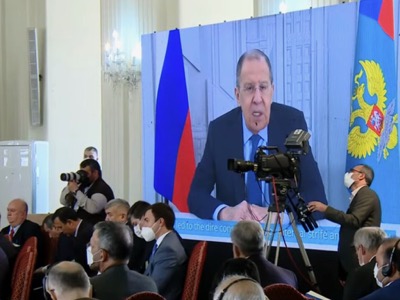
2185-27-10-2021
de-DE1 en-GB1 es-ES1 ru-RU1 fr-FR1
Colleagues,
I am delighted to welcome you to this meeting.
First of all, I would like to thank all the countries with representatives here for taking an active part in the recent meeting of the Moscow Format Consultations on Afghanistan, an exclusive platform that has no alternative when it comes to the scope and efficiency.
We have recently taken note of the increased activities of various regional and international forums on Afghanistan. It is important for them not to copy but to organically complement each other. I am confident that our discussion today will make a major contribution to our joint efforts to settle the numerous problems the Afghan people are facing and will help maintain stability and security in the region and beyond.
Today Afghanistan is a country that actually has to begin from scratch, to rise from the ruins in both the literal and the figurative meaning of the term. This is the logical result of two decades of the enforcement of the US-NATO model of state development. The Western countries’ stubborn desire to rebuild Afghanistan according to their own designs has led to dramatic consequences, namely, internal hostility and bloodshed, social polarisation, socioeconomic collapse and a humanitarian catastrophe. It has also encouraged rampant international terrorism and an unheard-of volume of drug production and corruption. But are the United States or other Western countries concerned? They always regarded Afghanistan, which is located thousands of kilometres away from them, as a useful instrument for attaining their narrow geopolitical goals.
A new administration has assumed power in Kabul. This is objective reality. The country has a real, although difficult to attain opportunity to return to the international stage as a responsible and peaceful state.
We respect the goals set out by the new Afghan authorities – to stabilise the military-political environment, to include representatives of national minorities and political forces in the transitional government, and to subsequently hold general elections. We have taken note of the efforts to resume the operations of the bodies of state administration, to create a regular army, and to ensure the safety of foreign diplomatic missions.
Russia is not inclined to force its advice or recommendations on anyone, the more so since history itself suggests effective solutions to problems. Having maximally full regard for the interests of all the main ethno-political forces in the country is of vital importance. It is for this reason that we firmly and consistently support the creation of a truly inclusive Afghan government. Citizens must know that their rights and lawful aspirations will be enforced, not in word but in deed and that they will be protected by the letter of the law – of course, with respect and consideration for the local traditions and customs.
As is obvious, it will hardly be possible to develop a normal foreign policy – particularly towards the neighbouring countries, which are the prime targets for the international terrorist groups that have become entrenched in Afghanistan and are being manipulated from the outside – unless a resolute fight is launched against drug production and trafficking as well as against these destructive forces.
For our part, we are planning to use all international and regional instruments at our disposal. I am referring to the resources available to the UN, the SCO, the CSTO, and other multilateral organisations. We are pleased to point to the closeness of the positions held by the participants in the recent Dushanbe summits. We are also pleased with the outcome of the special joint CSTO-SCO meeting.
Cutting short and controlling migration flows from Afghanistan is high on today’s agenda. This is of particular importance since terrorists and criminals are able and are already trying to penetrate adjacent countries under the guise of refugees. We can only reach this goal by creating normal living conditions in Afghanistan itself. In the future, this will become an important factor compelling the Afghans to come back home.
We once again call on the countries neighbouring on Afghanistan to prevent the US and NATO from establishing a military presence in their territory, given their plans to move there after pulling out of Afghanistan.
It is clear that immense financial outlays will be required to create Afghanistan’s national education and health systems and in general establish an effective socioeconomic infrastructure in the country. In this connection I would like to lay a special stress on the following: the main responsibility should be borne by those who have driven that country into its present state. In all evidence, it is high time we launched mobilisation work to amass resources for financial, economic and humanitarian aid to the Afghans.
I hope the principle of holding conferences for the sake of conferences, which the Westerners are so comfortable with, is already a thing of the past. The time has come for concrete action in this regard. I am confident that the United Nations should play the coordinating role. It was to the UN that the participants in the Moscow Format Consultations on Afghanistan addressed their appeal on October 20, 2021.
Russia is ready to make its contribution to the common effort. Quite soon, we are planning to send to our Afghan partners a batch of humanitarian aid consisting of food, medicines, and essential commodities.
In conclusion, I would like to wish you successful work.
Thank you.

 Articles by this author
Articles by this author











Stay In Touch
Follow us on social networks
Subscribe to weekly newsletter